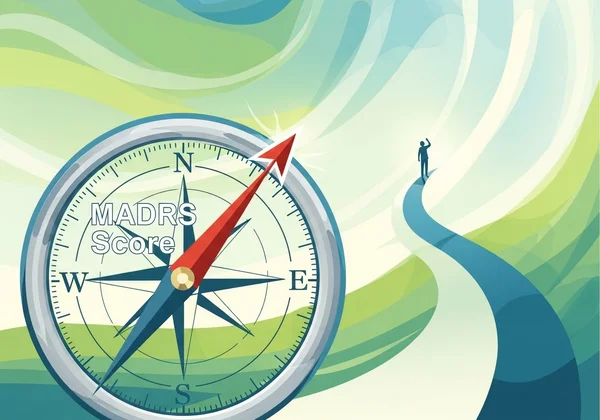MADRS 分數:評估後可採取的實際行動
收到您的 MADRS 分數 可能會帶來一連串的問題和情緒。這是一項重要的資訊,是您當前情緒狀態的快照,但請務必記住,它不是終點,而是一個起點。 MADRS 測驗之後該怎麼辦? 本指南旨在引導您採取清晰、讓您更有力量的且可執行的步驟,讓您在評估後能夠前行。讓我們將這個數字轉化為指引您清晰自信前進的羅盤。這趟旅程的第一步是理解,您可以隨時透過進行 MADRS 線上測驗 來重新評估並追蹤您的進度。

解讀您的 MADRS 分數:超越數字本身
您的蒙哥馬利-阿斯伯格抑鬱評量表 (MADRS) 分數是一個有價值的臨床指標,但將其視為不僅僅是一個數字至關重要。它是一個工具,可以幫助具體化那些常常讓人感到不知所措和抽象的情緒。將其視為您生命電影中的一個單一畫面——重要,但並非全部。
您的 MADRS 分數對您意味著什麼
MADRS 分數提供了抑鬱症狀嚴重程度的標準化測量。它是一種以醫療專業人員能夠理解的語言來傳達您經驗的方式。它反映了您過去一週在十個關鍵領域的感受,從悲傷和內心緊張到睡眠和食慾。這項 評估 是承認您當前狀態並為關於您身心健康的深入對話奠定基礎的強大第一步。
理解嚴重程度等級和臨床相關性
通常,MADRS 分數分為幾個嚴重程度等級:正常、輕度、中度或重度抑鬱症。雖然具體範圍可能略有不同,但這種分類有助於臨床醫生衡量症狀的強度。至關重要的是,只有合格的醫療專業人員才能提供準確的診斷。您的分數提供了重要的 臨床相關性,可作為基準,用於監測隨時間的變化,特別是在治療或療法後的反應。
立即行動:優先考慮自我照護和生活方式
無論您的分數如何,專注於基礎的自我照護都可以對您的情緒和整體復原力產生積極影響。這些不是治療方法,但它們是為您的心理健康建立更堅實基礎的強大工具。在您考慮進一步的 心理健康支持 時,將這些做法融入日常可以是一個積極的步驟。
簡單的生活方式調整以改善情緒
微小而持續的改變可以顯著改善您的感受。考慮將溫和的體育活動納入您的日常生活中,例如短暫的戶外散步。注意您的營養,專注於平衡膳食,以穩定您的能量和情緒。優先安排一致的睡眠時間表也至關重要,因為休息對於情緒調節至關重要。這些調整是 情緒改善 的核心,並幫助您找回掌控感。
規律作息和正念練習的力量
當感到不知所措時,結構可以帶來極大的安定感。建立簡單的日常 作息 可以減少決策疲勞,並提供可預測性和穩定感。同時,引入 正念練習 也有幫助。這不必複雜;它可以像花五分鐘專注於呼吸、心無旁騖地品嚐一杯茶,或者專注聆聽一段音樂一樣簡單。這些正念時刻可以幫助平息紛亂的思緒。

準備專業諮詢
您的 MADRS 分數是與醫生或治療師進行對話的絕佳工具。它為討論提供了一個清晰、客觀的起點。為這次預約做好準備將有助於您讓這次預約更有價值,並確保您能有效地溝通您的擔憂。
整理您的想法和關鍵觀察
在您的預約之前,花一些時間反思。記下您一直以來的感受。思考 MADRS 問題之外——您在情緒、行為或身體健康方面還注意到了哪些其他變化?這些感受是什麼時候開始的?什麼讓它們變得更好或更糟?準備好這些資訊有助於專業人士更全面地掌握您的狀況。
詢問您的醫生或治療師的重要問題
帶著準備好的問題進行諮詢會讓您感到更有力量。這表明您是自己照護的積極參與者。考慮詢問:
- 根據我的 MADRS 分數和症狀,您的初步想法是什麼?
- 潛在的下一步或治療方案是什麼?
- 您會推薦我進行哪些特定的生活方式改變?
- 我們如何利用 MADRS 等工具一起追蹤我的進度?
探索專業支持:治療方案
尋求專業幫助是力量的象徵。治療提供了一個安全、保密的空間,讓您可以探索自己的感受、發展應對策略,並在訓練有素的專家的幫助下朝著康復的目標邁進。有許多不同的方法,找到適合您的方法是旅程的關鍵部分。
了解不同類型的心理治療
有許多有效的 治療方案 可供選擇。例如,認知行為療法 (CBT) 幫助您識別並改變負面思維模式和行為。心理動力學療法則探索過去的經歷如何影響您當前的感受。找到一位專長於與您需求相關領域的治療師,對於建立信任和有效的治療關係至關重要。
如何找到適合您需求的治療師
尋找治療師可能令人望而生畏,但有許多資源可用。您可以從向您的家庭醫生尋求轉介開始。專業組織提供的線上目錄也是很好的資源。當您聯繫時,請不要猶豫詢問他們的治療方法、經驗和費用。許多治療師會提供簡短的初步諮詢,以了解是否適合您。

建立您的支持網絡:朋友、家人和社區
儘管專業幫助至關重要,但您的個人支持系統同樣重要。與他人建立聯繫可以減輕抑鬱症常伴隨的孤立感。培養這些連結是自我照護的強大行動。
聯繫親人:溝通策略
談論您的心理健康可能很困難,但通常是一種解脫。選擇一個您信任的人,並選擇一個您不會匆忙的時間。您不必一次性分享所有事情。您可以從說:「我最近過得很艱難,我需要一些支持」開始。清楚地表達您的需求,無論是一個願意傾聽的對象還是協助處理實際任務。
探索線上和本地支持團體
有時候,與有相似經歷的人交談會讓人感覺被理解和認同。同儕的 支持網絡 提供了一個您可以開放分享而不用擔心被評判的空間。透過社區中心或心理健康組織尋找本地團體。如果這樣感覺更自在,線上論壇和社區也可以提供寶貴的連結和匿名性。
利用我們的平台進行持續監測
您的心理健康旅程是動態的,您的症狀會隨時間而變化。使用我們的平台不僅僅是為了獲得一次性分數;它是為了擁有一個持續監測和更透徹的理解的工具。這才是評估的真正力量所在。
追蹤您的進度:定期評估的價值
定期進行 MADRS 評估可以讓您看到症狀的趨勢。它們是否隨著新的療法或生活方式改變而改善?某些情況是否使它們惡化? 追蹤您的進度 為您和您的醫療保健提供者提供了寶貴的數據,以便就您的照護做出有根據的決定。我們鼓勵您定期 開始您的評估,以保持對您旅程的清晰了解。
透過您的 AI 驅動報告解鎖更深入的洞察
對於那些希望更進一步的人,我們平台上的可選 AI 驅動報告 將您的分數轉化為個人化洞察。它可以幫助識別您獨特的優勢、挑戰以及您的症狀對日常生活的潛在影響,提供為您量身定制的實用建議。這份報告是您分數的強大補充,為您提供了更全面、更深入的理解,您可以自行探索或與您的支持團隊分享。您可以隨時 立即取得您的分數 以開始。
![]()
帶著您的 MADRS 分數,邁向充滿力量的未來之路
您的 MADRS 分數是行動的催化劑,而不是標籤。它標誌著一個邁向更好心理健康的知情且充滿力量的旅程的開始。透過理解您的分數、實踐自我照護、尋求專業指導,以及利用工具進行持續監測,您正在掌控局面。請記住,這是一條進步之路,而非完美之路。對自己要有耐心和同情心。
準備好邁出理解和監測您身心健康的下一步了嗎?今天就 訪問我們的網站,善用這個值得信賴的工具來開啟您的心理健康之旅。
關於您的 MADRS 評估的常見問題
如何解讀 MADRS 分數?
MADRS 分數通常根據抑鬱症狀的嚴重程度(例如,輕度、中度、重度)進行範圍解讀。然而,分數的真正意義來自於其上下文。受過訓練的臨床醫生是結合您的個人病史和整體情況解讀您的分數的最佳人選。該分數是一種臨床工具,旨在輔助而非取代專業診斷。
正常的 MADRS 分數是多少?
0-6 分的範圍通常被認為是正常範圍,表示極少或沒有抑鬱症狀。高於此閾值的分數表示值得進一步關注的症狀。與醫療專業人員討論任何讓您擔憂的分數非常重要,以了解它對您具體意味著什麼。
我可以使用 MADRS 進行自我評估嗎?
是的,MADRS 可以是一個非常有用的自我評估和監測工具。它幫助您追蹤症狀隨時間的變化,並提供客觀資訊與醫生或治療師分享。然而,它不是診斷工具。自我評估之後應始終進行專業諮詢,以獲得精確的診斷及治療計畫。您可以將 我們的免費評估 作為起點。
MADRS 測驗在我們的網站上是免費的嗎?
是的,在我們的網站上進行標準的 10 題 MADRS 評估並獲得您的分數是完全免費的。這讓每個人都能使用這個黃金標準的臨床工具。對於想要更深入、專屬的個人化洞察的使用者,我們提供一份可選的、全面的 AI 驅動分析報告,需付費。